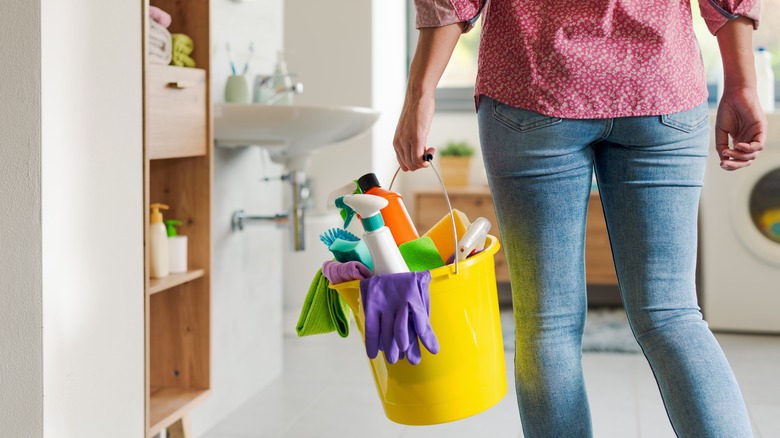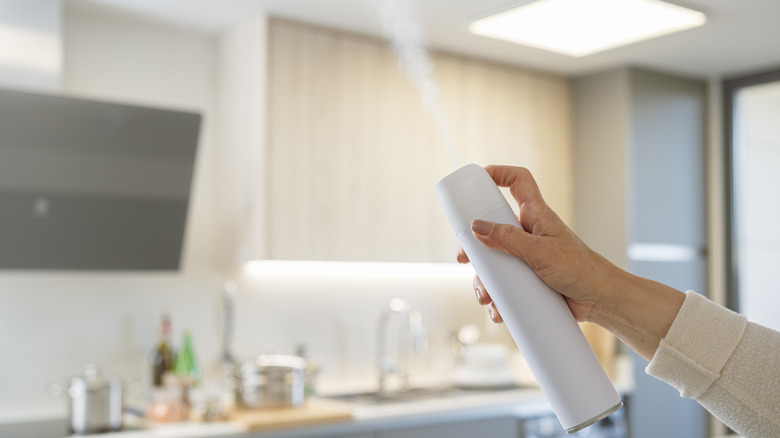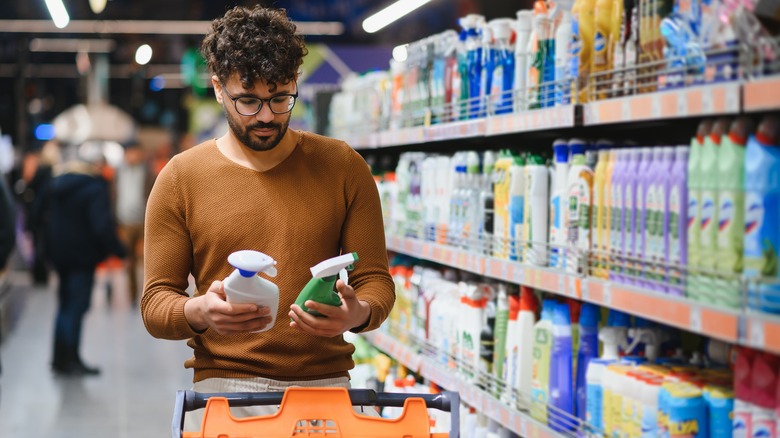The Cleaning Essential Experts Say To Ditch For Healthier Indoor Air
As more people spend time inside their homes, there's also growing concern over poor indoor air quality. According to the American Lung Association, the average air inside most homes is at least two to five times more polluted than the air outside, although this can be much higher. Cleaning products are just one contributor to poor indoor air quality. While these chemicals can be harmful to anyone, they're especially irritating to people who have respiratory problems. Fragrances are a group of ingredients in many cleaning products that experts do not recommend if you want healthier indoor air.
In theory, cleaning your home might also get rid of underlying odors that might make it smell bad. The cleaning product industry is notorious for marketing numerous products with fragrances designed to make our homes smell "good." Aside from air fresheners, just about any cleaning product may include fragrances, including all-purpose cleaners, glass cleaners, soaps, floor cleaners, and even bleach. Not only can cleaning products emit chemicals into the air that can negatively affect your indoor air quality, but fragrances can make such impacts worse. Just because a fragranced product smells good, it doesn't mean it's healthy to use inside your home. In fact, there are several small habits that will make your home smell better without the use of fragrances, including opening windows during the day, taking out the trash daily and deodorizing the can, and getting area rugs cleaned professionally.
How fragrances affect indoor air quality, and why you might want to avoid them
Fragrances might seem harmless, but these synthetic products are actually part of a group of chemicals called volatile organic compounds (VOCs). These are emitted into the air as gases, and can then stick to surfaces throughout your home. Aside from scented cleaning products, VOCs exist in thousands of items you might use in your home, including cosmetics, waxes, and paints. It's for this reason that you should avoid buying paint with this ingredient too.
With all this in mind, using fragranced products to make your home smell good may not be worth the associated risks. VOCs in fragrances and cleaning products may cause kidney and liver damage, and are also associated with worsening allergies and respiratory illnesses. They can lead to headaches, as well as eye and throat irritation. There's also a concern over possible reproductive and neurological effects from long-term exposure to fragrances in both inhaled and topical form.
Unfortunately, essential oils are not necessarily any safer than synthetic fragrances. Not only does the lack of regulation over essential oils mean there's no guarantee of a product's advertised ingredients, but these "natural" products still produce VOCs in the air, too. Examples include commonly used essential oils, such as lavender and tea tree. This means that a cleaning product with essential oils may still contribute to unhealthy air quality in your home.
Reduce your reliance on fragrances for better indoor air quality
If you do buy commercial cleaning products, you can help reduce the number of VOCs in your home by avoiding fragrances. At the very least, you should avoid air fresheners of any kind. Read other cleaning product labels carefully and don't buy any that list "fragrance" as an ingredient. It can take some time getting used to not having the scent of citrus, lavender, or other fragrances linger after cleaning your home, but your long-term health will likely benefit. Another rule for using any commercial cleaning products is to use them in well-ventilated spaces, such as near an open window or with a ventilation fan running.
You can also try your hand at making your own cleaning ingredients. Lung health experts recommend using non-fragranced soap and warm water for everyday cleaning. You can use diluted white vinegar in a spray bottle for cleaning glass, and even make a scrubbing paste from water and baking soda for tougher messes. To get started, make a list of all the natural cleaning ingredients that you'll want a healthy stock of in your home.


